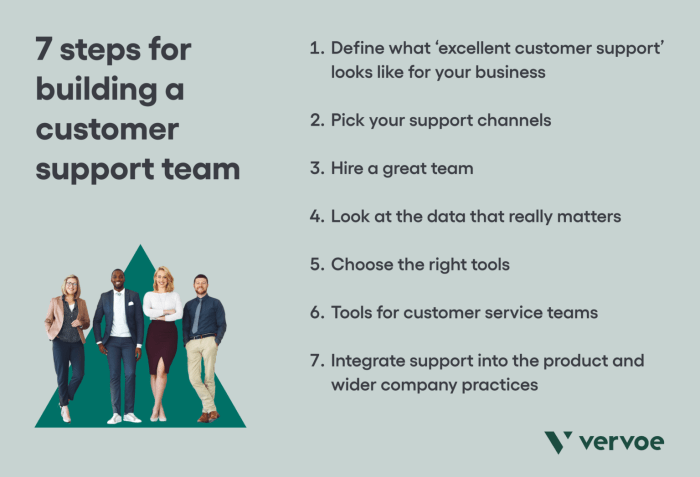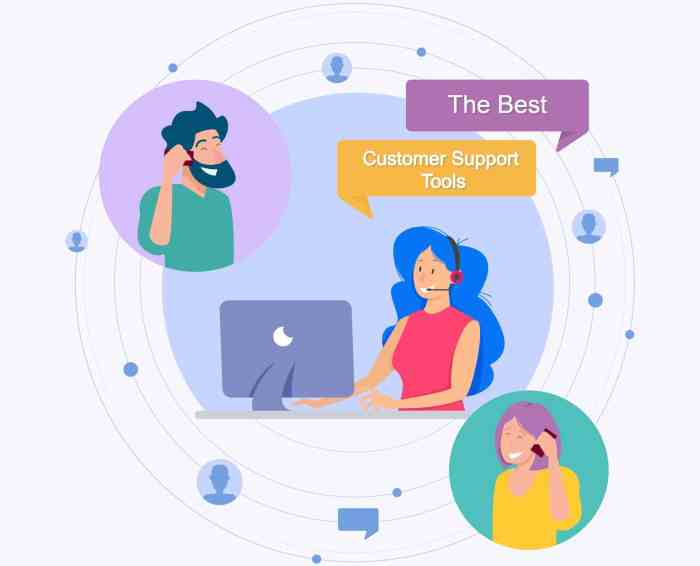Developing Customer Support Solutions: Enhancing Customer Experience dives into the world of tailored support systems, highlighting key elements and successful strategies across industries. Get ready to explore the impact of poor solutions and the role of automation in revolutionizing customer support.
Understanding Customer Support Solutions
In today’s competitive business landscape, providing exceptional customer support is crucial for maintaining customer satisfaction and loyalty. Developing tailored customer support solutions is essential to address the unique needs and preferences of each customer, ultimately leading to improved customer retention and brand reputation.
Key Elements of Effective Customer Support Solutions
- Timely Response: Promptly addressing customer inquiries and issues shows that you value their time and concerns.
- Personalization: Tailoring support solutions to individual customers can create a more personalized and engaging experience.
- Multi-Channel Support: Offering support through various channels such as phone, email, chat, and social media ensures accessibility and convenience for customers.
- Empathetic Communication: Showing empathy and understanding towards customers’ problems can help build trust and rapport.
Successful Customer Support Solutions in Different Industries
- Apple’s Genius Bar: Apple’s in-store customer support service provides personalized assistance and troubleshooting for customers with Apple products.
- Zappos’ 24/7 Customer Support: Zappos is known for its round-the-clock customer support team that goes above and beyond to ensure customer satisfaction.
- Ritz-Carlton’s Customer Service Culture: Ritz-Carlton employees are empowered to resolve customer issues on the spot, leading to exceptional service experiences.
Impact of Poor Customer Support Solutions on Businesses
- Decreased Customer Satisfaction: Inadequate support can lead to frustrated customers and decreased satisfaction levels.
- Loss of Customers: Poor support experiences may result in customers switching to competitors who offer better service.
- Damaged Reputation: Negative word-of-mouth and online reviews can tarnish a company’s reputation and brand image.
Designing Customer Support Systems

In designing customer support systems, it is essential to consider the specific needs and requirements of your customers. This process involves analyzing customer feedback, identifying common issues, and determining the best ways to address them effectively.
Comparing Software Options
When it comes to software options for developing customer support solutions, there are several choices available in the market. Some popular options include Zendesk, Freshdesk, and Salesforce Service Cloud. Each of these software solutions offers unique features and capabilities, so it’s crucial to evaluate them based on your business requirements and budget constraints.
- Zendesk: Known for its user-friendly interface and comprehensive ticketing system, Zendesk is a popular choice for businesses of all sizes.
- Freshdesk: With its intuitive design and multi-channel support capabilities, Freshdesk is ideal for companies looking to streamline their customer support processes.
- Salesforce Service Cloud: As part of the Salesforce ecosystem, Service Cloud offers robust CRM integration and advanced analytics for in-depth customer insights.
It’s important to choose a software solution that aligns with your business goals and can scale as your customer support needs grow.
Implementing a New System
Implementing a new customer support system involves the following steps:
- Assess your current support processes and identify areas for improvement.
- Select the appropriate software solution based on your analysis and budget constraints.
- Train your team on using the new system effectively and efficiently.
- Monitor the system’s performance and gather feedback from both customers and support agents for continuous improvement.
Role of Automation, Developing Customer Support Solutions
Automation plays a crucial role in enhancing customer support solutions by streamlining repetitive tasks, improving response times, and increasing overall efficiency. Implementing automation tools such as chatbots, ticket routing, and knowledge base systems can help reduce customer wait times and provide faster resolutions to common issues.
Implementing Customer Support Strategies

In order to provide effective customer support, it is crucial to implement the right strategies that cater to the needs of modern consumers. This involves training customer support teams, utilizing omnichannel support, integrating AI and machine learning, and adopting innovative approaches.
Training Customer Support Teams
Training customer support teams effectively is essential for ensuring they have the knowledge and skills to assist customers efficiently. This includes providing comprehensive product training, teaching effective communication techniques, and emphasizing the importance of empathy and patience.
Importance of Omnichannel Support
Omnichannel support is vital in modern customer support solutions as it allows customers to interact with businesses seamlessly across multiple platforms. Whether it’s through phone, email, chat, or social media, providing a consistent and integrated experience enhances customer satisfaction and loyalty.
Integrating AI and Machine Learning
Integrating AI and machine learning in customer support solutions can streamline processes, improve response times, and personalize interactions. Chatbots, predictive analytics, and sentiment analysis are just a few examples of how AI technologies can enhance the overall customer support experience.
Innovative Customer Support Strategies
Leading companies are constantly innovating their customer support strategies to stay ahead of the competition. For example, some companies have implemented self-service portals, proactive outreach programs, and personalized customer journeys to provide a unique and tailored support experience.
Measuring Success in Customer Support: Developing Customer Support Solutions
Customer support solutions are only as good as the results they deliver. It is crucial to have key performance indicators (KPIs) in place to measure the success of these solutions, ensure customer satisfaction, and drive continuous improvement.
Key Performance Indicators (KPIs)
- First Response Time: The time taken to respond to customer queries or issues.
- Resolution Time: The time taken to resolve customer problems.
- Customer Satisfaction Score (CSAT): Feedback directly from customers on their experience.
- Net Promoter Score (NPS): Measures the likelihood of customers to recommend your service to others.
Significance of Customer Feedback
Customer feedback is invaluable for improving support systems. It provides insights into areas that require attention, helps in understanding customer needs and preferences, and guides the development of more effective solutions.
Utilizing Data Analytics
Data analytics plays a vital role in optimizing customer support processes. By analyzing data on customer interactions, feedback, and trends, organizations can identify patterns, predict customer behavior, and make informed decisions to enhance the overall support experience.
Best Practices for Continuous Improvement
- Regularly review and update KPIs based on changing business needs and customer expectations.
- Invest in training and development for support staff to enhance their skills and knowledge.
- Implement automated workflows and AI-powered tools to streamline support operations and increase efficiency.
- Encourage a culture of feedback and collaboration within the support team to drive innovation and improvement.